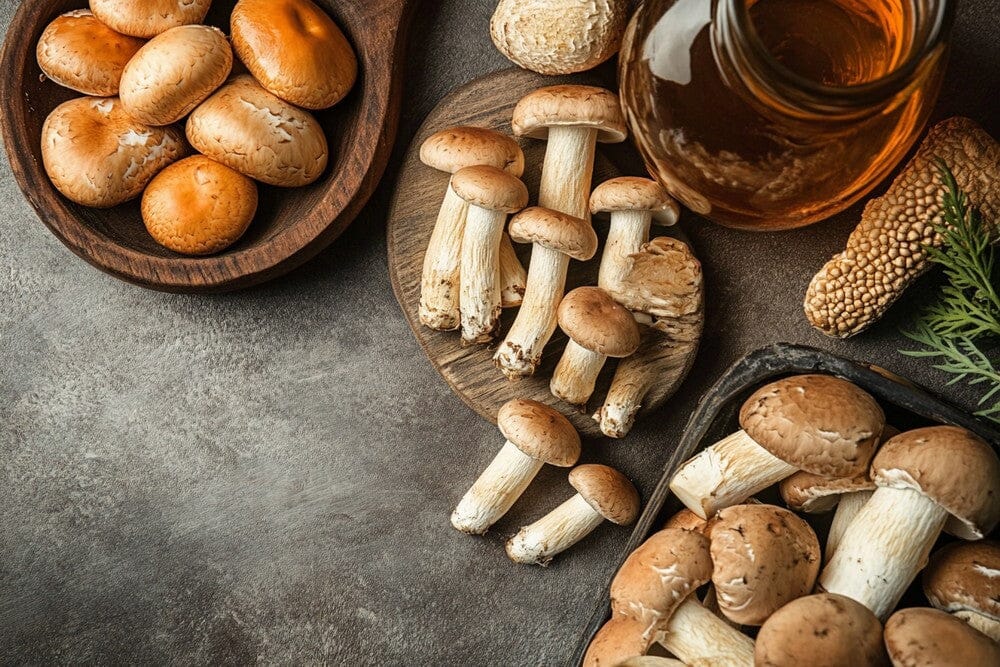Mushrooms have been revered for centuries, not just for their culinary appeal, but for their potential health benefits. Among these, their ability to support the immune system stands out.
From the forest floor to your dinner plate, these fascinating fungi offer a natural way to boost your body’s defenses. Let’s explore how edible mushrooms can play a crucial role in maintaining a robust immune system.
This article is brought to you by Health Nutrition – your complete health and wellness community. Health Nutrition offers everything you need to achieve your goals and live a fitter, healthier, happier life, all in one place. From personalized diet and exercise plans to one-on-one guidance from health coaches, Health Nutrition supports you every step of the way.
Understanding Mushrooms and Their Nutritional Value
Mushrooms are neither plant nor animal, occupying a unique space in the natural world. These fleshy, spore-bearing fruiting bodies of fungi are packed with an impressive array of nutrients.
Fresh mushrooms are low in calories but high in beneficial compounds. They’re a good source of protein, fiber, and various vitamins and minerals.
One standout nutrient in mushrooms is vitamin D. When exposed to sunlight or UV light, many mushrooms can produce this essential vitamin, making them one of the few non-animal sources of this nutrient.
The nutritional value of mushrooms extends beyond just vitamins and minerals. They contain unique compounds like beta-glucans and antioxidants that contribute to their health-promoting properties.
The World of Edible Mushroom Species
The kingdom of fungi is vast, with thousands of mushroom species. However, only a fraction of these are edible and cultivated for consumption.
Some popular edible mushrooms include button, shiitake, portobello, oyster, and maitake. Each species has its unique flavor profile and nutritional composition.
While some mushrooms are prized for their taste, others are sought after for their potential health benefits. Many of these “medicinal” mushrooms have been used in traditional medicine for centuries.
Mushroom Cultivation and Harvesting
Cultivated mushrooms make up the majority of what we consume. These are grown in controlled environments, ensuring consistent quality and safety.
Wild mushrooms, on the other hand, grow naturally in forests and fields. While they can be delicious and nutritious, foraging requires expert knowledge to avoid poisonous varieties.
Many mushrooms thrive on decaying wood or other organic matter. This unique growing environment contributes to their nutritional profile and potential health benefits.
Top Mushrooms for Boosting Immune Function

While all edible mushrooms offer some health benefits, certain varieties stand out for their potential to support a healthy immune system. These mushrooms contain compounds that may help modulate immune function and enhance our body’s natural defenses.
Let’s explore some of the most promising mushrooms known for their immune-boosting properties and the research behind their therapeutic effects.
Shiitake: The Versatile Immune Booster
Shiitake mushrooms are not just a delicious addition to your stir-fry; they’re also powerhouses of immune support. These popular fungi have been used in traditional medicine for centuries.
Eating shiitake mushrooms regularly may help enhance the production of immune cells. They contain a polysaccharide called lentinan, which has been studied for its potential to boost immune function.
Beyond immune support, shiitake mushrooms offer a range of other health benefits. They’re rich in B vitamins and have been associated with heart health and weight management.
Maitake: The Dancing Mushroom for Immunity
Maitake, also known as “hen of the woods,” is another star in the world of immune-boosting mushrooms. Its name in Japanese means “dancing mushroom,” perhaps due to the joy of finding this prized fungus in the wild.
Research suggests that maitake mushrooms may enhance the activity of certain immune cells. They contain beta-glucans, complex sugars that are believed to stimulate the immune system.
Maitake has also been studied for its potential to support healthy cell growth. While more research is needed, early studies show promising results in this area.
Reishi: The Mushroom of Immortality
Reishi mushrooms, scientifically known as Ganoderma lucidum, have been revered in traditional Chinese medicine for thousands of years. They’re often called the “mushroom of immortality” due to their purported health-promoting properties.
These fungi are known for their potential to modulate the immune system. They may help enhance the function of certain white blood cells, key players in our immune defense.
Beyond immune support, reishi mushrooms have been studied for their potential benefits in various health conditions. However, more research is needed to fully understand their effects.
Turkey Tail: The Colorful Immune Supporter
Turkey tail mushrooms get their name from their striking, colorful appearance resembling a turkey’s tail. But their beauty isn’t just skin deep – these fungi are powerful immune supporters.
Researchers have found that turkey tail mushrooms contain compounds that may stimulate immune function. They’ve been studied extensively, particularly in relation to immune health during cancer treatment.
A meta-analysis of multiple studies suggested that turkey tail mushroom extracts may have beneficial effects when used alongside conventional cancer treatments. However, always consult with a healthcare provider before using any supplements.
Common Edible Mushrooms with Immune-Boosting Properties
While some mushrooms are renowned for their medicinal properties, many common edible varieties also offer immune support. These everyday mushrooms can be easily incorporated into your diet, providing both flavor and potential health benefits.
Let’s explore some of these readily available mushroom varieties and their immune-boosting potential.
White Button and Cremini Mushrooms
White button mushrooms and cremini mushrooms are actually the same species, Agaricus bisporus, at different stages of maturity. These familiar fungi are staples in many kitchens.
Despite their humble appearance, white button mushrooms pack a nutritional punch. They contain compounds that may help stimulate the immune system and enhance the function of natural killer cells.
Cremini mushrooms, being more mature, often have a slightly higher concentration of certain nutrients. Both varieties are excellent sources of selenium, a mineral important for immune function.
Oyster Mushrooms: A Delicate Immune Enhancer
Oyster mushrooms, or Pleurotus ostreatus, are known for their delicate flavor and meaty texture. But they’re not just a culinary delight – they also offer potential immune benefits.
These mushrooms contain beta-glucans, which may help modulate the immune system. They’re also rich in antioxidants, which support overall health and may indirectly benefit immune function.
King oyster mushrooms, a larger variety, are particularly prized for their texture. They can be a great meat substitute in many dishes, offering both flavor and potential health benefits.
Incorporating Immune-Boosting Mushrooms into Your Diet
Now that we’ve explored the potential benefits of various mushrooms, you might be wondering how to incorporate more of these fungi into your diet. The good news is that mushrooms are versatile and can be added to a wide range of dishes.
Let’s look at some practical ways to increase your mushroom intake and make the most of their immune-boosting properties.
Cooking Methods to Preserve Nutritional Value
To get the most nutrients from your mushrooms, it’s important to cook them properly. While raw mushrooms are safe to eat, cooking can actually increase the bioavailability of certain nutrients.
Gentle cooking methods like sautéing or steaming are great for preserving nutrients. Avoid boiling mushrooms in water, as this can cause water-soluble nutrients to leach out.
For dried mushrooms, rehydrating them in hot water creates a flavorful broth that’s packed with nutrients. Don’t discard this liquid – use it in soups or sauces for an extra nutritional boost.
Delicious Mushroom Recipes for Immune Support
Adding mushrooms to your meals doesn’t have to be complicated. A simple sauté with garlic and herbs can transform any mushroom into a delicious side dish.
For a hearty main course, try a mushroom risotto using a mix of different varieties. The combination of flavors and textures makes for a satisfying meal.
Mushroom soups are another great option. A creamy mushroom soup can be both comforting and nourishing, especially during cold and flu season.
Don’t forget about mushroom-based condiments. A mushroom pâté or duxelles (finely chopped mushrooms cooked down with shallots and herbs) can add a burst of umami flavor to many dishes.
The Science Behind Mushrooms and Immunity
The immune-boosting properties of mushrooms aren’t just folk wisdom – there’s a growing body of scientific research supporting these claims. Let’s delve into what science has to say about how mushrooms interact with our immune system.
Many studies have focused on how compounds in mushrooms affect various components of the immune system, from red blood cells to specialized immune cells. The results are promising, suggesting that mushrooms may indeed play a role in supporting immune health.
Research has shown that certain mushroom extracts may help prevent cell damage caused by oxidative stress. This is important because oxidative stress can weaken the immune system over time.
While more research is needed, current studies suggest that regular consumption of a variety of mushrooms may contribute to a more robust immune response. However, it’s important to remember that mushrooms are just one part of a healthy, balanced diet.
Beta-Glucans: The Key to Mushroom Immunity
Beta-glucans are complex sugars found in the cell walls of many fungi, including mushrooms. These compounds are typically found in high concentrations in mushrooms and are believed to be key players in their immune-boosting properties.
When we consume mushrooms containing beta-glucans, these compounds interact with immune cells in our gut. This interaction can trigger a cascade of events that enhance our overall immune function.
Research suggests that beta-glucans may help activate certain immune cells, making them more effective at identifying and neutralizing potential threats. This makes mushrooms a rich source of natural immune support.
Other Bioactive Compounds in Mushrooms
While beta-glucans get a lot of attention, mushrooms contain a variety of other bioactive compounds that contribute to their health benefits. These include various vitamins, minerals, and antioxidants.
Each type of fungus has its own unique profile of bioactive compounds. This is one reason why consuming a variety of mushroom species may offer more comprehensive health benefits.
Many of these compounds work synergistically, meaning their combined effect is greater than the sum of their individual effects. This highlights the importance of consuming whole mushrooms as foods rather than isolated extracts.
Potential Risks and Considerations
While mushrooms offer numerous health benefits, it’s important to be aware of potential risks and considerations. Like any food, mushrooms can cause adverse reactions in some individuals.
One consideration is sodium intake. Some preserved or prepared mushroom products may contain added salt. If you’re watching your blood pressure, be sure to check labels and opt for fresh or low-sodium options when possible.
It’s also worth noting that while mushrooms are generally safe for most people, they can interact with certain medications. If you’re on any medications or have ongoing health concerns, it’s always best to consult with a healthcare provider before significantly increasing your mushroom intake.
Allergies and Sensitivities to Mushrooms
While rare, some humans can develop allergies or sensitivities to mushrooms. Symptoms can range from mild digestive discomfort to more severe allergic reactions.
If you experience any unusual symptoms after eating mushrooms, it’s important to stop consumption and consult with a healthcare provider. They can help determine if you’re at risk and provide guidance on how to safely include mushrooms in your diet.
Proper Identification of Wild Mushrooms
While foraging for wild mushrooms can be exciting, it’s crucial to properly identify any mushrooms before consuming them. Many poisonous species closely resemble edible ones, making expert knowledge essential for safe foraging.
Some mushrooms produce vitamin D when exposed to ultraviolet light or sunlight. However, UV light exposure doesn’t make all mushrooms safe to eat – proper identification is still crucial.
Conclusion: Harnessing the Power of Mushrooms for Immune Health
Mushrooms are truly nature’s hidden treasure when it comes to supporting our immune system. From common varieties like button mushrooms to exotic species like reishi, these fungi offer a wealth of immune-boosting compounds.
Incorporating a variety of mushrooms into your diet can be a delicious and effective way to support your body’s natural defenses. Whether you’re sautéing shiitakes for dinner or sipping on a reishi tea, you’re giving your immune system a natural boost.
For those looking to harness the power of mushrooms in a more concentrated form, Health Nutrition offers a Mushroom Immune Booster supplement. This product is designed to provide natural immune system support, leveraging the beneficial properties of various mushroom species.
The Mushroom Immune Booster supplement goes beyond just supporting immune function. It’s formulated to naturally fight inflammation, a key factor in many health issues. Additionally, it aims to boost energy levels, contributing to overall health and wellbeing.
Remember, supporting your immune system is a holistic endeavor. While mushrooms and mushroom supplements can play a significant role, they work best as part of a balanced diet, regular exercise, adequate sleep, and stress management. Here’s to your health, powered by the fascinating world of mushrooms!
Source link










